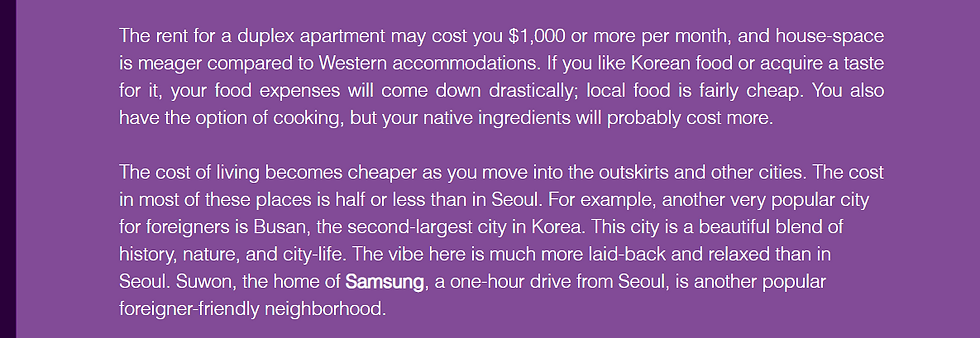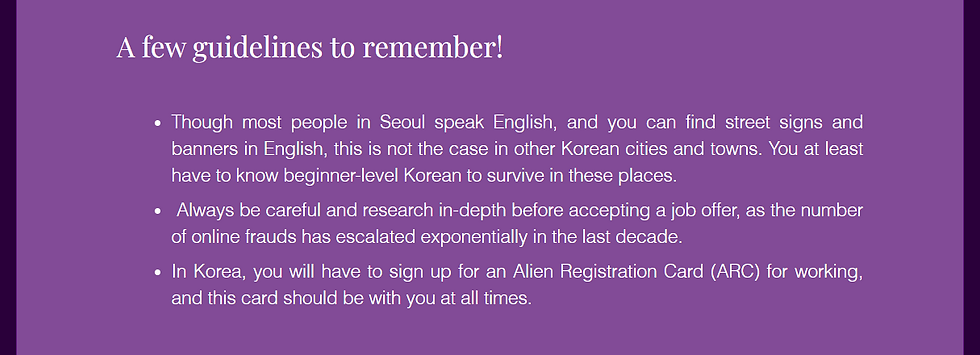Check Ourselves: Facts - Is Life in South Korea the Utopian dream?
- Borasaek Vision

- Mar 24, 2021
- 5 min read
What is Check Yourself: Facts? - This series, called CY:F for short, was created to analyze media and their presentation of BTS and ARMY. We initially intended this series to be a critique of specific articles that didn’t follow the practices of journalistic integrity while reporting about BTS and ARMY.
Borasaek Vision Magazine debuted with a series of blogs that listed the defining principles of good journalism, one of them being unbiased reporting. But what do we do when we ourselves deviate from the journalistic practices that we want other media houses to follow?
We check ourselves!

Why are we doing this CY:F or rather CO:F?
Recently, we published a blog titled “The Utopian Dream: Life in South Korea.”
One of our readers pointed out that our blog reeked of bias towards a particularly utopic representation of the life of foreigners in South Korea. The review of our audience is of great value to us. When we realized that we had fallen short of the quality that readers expected from us, we decided to review our own work. And the best way we could do that was through “Check Ourselves: Facts.”
When we came up with the topic of the ”utopian dream” of living a life in BTS’ native country, we intended to provide ARMY with a general idea of the living conditions and jobs for foreigners in South Korea. In retrospect, as the writer, I realize that I had presented the scenario as a veil without revealing the darker details of everyday life. Just the thought of breathing the same air as BTS made me dress my blog in glossy and flowery words. But, isn’t that what dreams are like – bright and cheerful? It would have been fine had it just been a dream. However, when we are writing about the reality of living in a place, we should be more objective about the image we present and discuss both the positive and negative sides. In the original blog though, we mostly focused on just the positives.
That being said, we did try to highlight some of the most relevant issues that a foreigner would face in Korea. The first issue we brought up was the high cost of living in Seoul as compared to other cities and towns.

A few other points were raised in relation to the limitations of language barriers and the risk of online fraud. But the rest of the blog was dedicated to the utopian life.

What did we want to convey and what did we leave out?
Our blog never intended to present our readers with ‘half-truths’. But we accept with all sincerity that it only focused on the better parts.
Then readers, what is actual life in South Korea like for foreigners? It is somewhat like what we have written in the blog but more. The life of a foreigner is different from that of a native in Korea. Isn’t that obvious? How exactly is it different?
In South Korea, transportation during working hours is cheap and easily accessible. The problem for foreigners starts after the state-run buses stop running for the night and the only option left is taxis. Taxi drivers discriminating against foreigners is a well-known problem in South Korea. They may either refuse you or try to extort more money than the regular fare. Refusing a passenger is illegal, so you can definitely report the driver who tries to dupe you in any way. But that doesn’t make the hassle of getting home after a long day any better. This brings us to the next problem – the high-pressure society.

There is intense competition in every walk of life in Korea – you may be judged on details ranging from what you wear at the office to what restaurant you choose to dine at. Korea also has a culture of working insanely long hours. If you work under a Korean boss, you might have to follow the rules set by them without question due to the strict social hierarchy in Korea.
Also, a foreigner in Korea will always be seen as a foreigner. Neither your Korean skills nor your hospitality will be able to break that visible barrier between natives and foreigners. Korean society is racially homogenous and thus not very inclined to accommodate foreigners. However, knowing the language will put you on some common ground with the locals; not only will you be able to communicate more, but you can also develop stronger relationships.
Women have it difficult everywhere, and South Korea is no exception. Foreign women who’ve had lived in South Korea have often questioned the security of women in the country because of the discrimination they have faced. Discrimination, cat-calling, groping, stereotyping – the list goes on. Real-life Korean men are far from the exalted images of K-drama oppas. Even South Korean men are sometimes burdened by such lofty images. In reality, they are just normal men – similar to the blood and flesh humans you see in your country. It is expected of a normal human being to have flaws and that should be applied to Korean men as well.
A blog would not be enough for listing out all the problems you might face as a foreigner in South Korea. Foreigners may face these problems and more depending on the international relationship of South Korea with their home country.
Can life anywhere be a utopian dream?
Now your question for us would be why did we choose to leave out all of this information from the blog? Our answer is simple. Each country has its socio-political background coupled with its economic status. Is there any country in the world that is problem-free? South Korea is one of the Asian countries where the traditions have sustained despite major technological advancements. Korean society is tightly knit with culture and technology. Even though you will always be seen as a foreigner, the community may warm up to you. There will always be two sides to the coin.
Also, can we honestly say that we - foreigners or not - don’t face any problems in our native country? In my little experience of foreign travel, I have faced a variety of issues. A couple of years ago I went to Bhutan - a country that actually shares its boundaries with my state in India. Bhutan was by no means across the globe from my home and yet, I felt heads turning my way, accompanied by uncomfortable stares every time I left the hotel. But at the end of the day when I wrote my journal, I wrote of the beautiful mountains, the cheerful children I played a game of football with, and the amma (mother) who would make me hot dumpling soup whenever the mercury dropped below the freezing point. The good is what stays with us and the good is what we wanted to focus on in the blog.
Whether life in South Korea is a utopian dream or not depends upon your perspective. Many ARMYs, including myself, would be ready to undergo the hardships of living as a foreigner in Korea if it meant we would be under the same sky as BTS. For others, the obstacles may take the upper hand and that is okay too.
Our job here at BVM is to provide balanced and accurate information. I apologize to our readers for not being able to do so in our last blog. We hope that this blog will amend our previous mistakes, and we promise to cover all angles of stories in the future. Please continue to give us your valuable feedback – they are the little lights that guide us when we are blinded by the spotlight.

DISCLAIMER: We do not own any audio & visual content in this video except for the editing. ALL RIGHTS BELONG TO THE RIGHTFUL OWNERS. No copyright infringement intended.
Written by Basabdatta
Edited by: Ash
Checked by: Clare







Comments